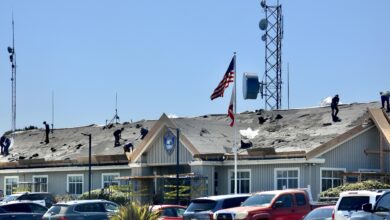Wall Street crisis hits WaMu, Wachovia but impact is less locally
Like many middle class Americans, Anna Marie Stenberg of Fort Bragg suffers with an adjustable rate mortgage and still hates the idea of a bailout of Wall Street”s mega lenders.
Stenberg has been seeking refinancing on her home but the credit crunch has prevented her — and many others from doing so. The bailout was intended to loosen that credit crunch and yet is overwhelmingly unpopular among voters.
Stenberg, Susan Nutter and Tom Cahill were among about a dozen locals who protested the bailout outside Town Hall on Saturday as part of a nonpartisan nationwide grassroots rebellion against the bailout — a movement mostly overlooked by the national media.
“If even the most ardent supporters of the bailout don”t know if it will work to turn the economy around, why is the government even considering it?” Stenberg said.
“Nothing in this bailout will provide jobs, lower gasoline, utility and food prices, save homes or give us affordable health care. We need an FDR approach,” she said.
Democrat Franklin Delano Roosevelt led America out of the Great Depression in the 1930s, ending Republican Herbert Hoover”s reign of free market deregulation with laws restricting banking and lending.
Many of those laws were repealed in the last 20 years in a bi-partisan revival of deregulation that favored mega-mergers and removed Depression-era restrictions on lending. A new bi-partisan coalition against the bailout emerged in force on Monday, stunning pundits and the leadership of both political parties.
Congressman Mike Thompson who represents the Mendocino Coast, was among the minority of liberal Democrats who sided with a majority of conservative Republicans on Monday in rejecting the bailout. President Bush and the Democratic leadership desperately wanted the $700 billion Wall Street rescue package to pass.
“Thompson”s no” vote was a surprise; a pleasant surprise for a change,” said Cahill.
Thompson, who has described himself as an ardent free trader, is often criticized for being too conservative on economic issues by local progressives.
“He also voted against Pelosi on oil drilling off our coast. I could say something sarcastic but I won”t. I appreciate these two important votes too much,” Cahill said.
Impact on WaMu
So far, the greatest impact of the Wall Street crisis on Fort Bragg has been the failure of Washington Mutual and the federal firesale of Wachovia Bank.
The federal government has found buyers for both mortgage red paper-troubled banks, as part of a new strategy of “saving” huge global banks by creating even larger mega-banks. Those who blame the merger-deregulation mentality for the disasters on Wall Street question whether the creation of three new super mega-banks over the past two month could make America even more vulnerable, not safer.
On Thursday, JPMorgan/Chase purchased all deposit and loan accounts, and all branches, of Washington Mutual. That means everyone; even those with more than $100,000 in their account have felt no effect from the biggest bank collapse in U.S. history.
Melinda Overturf, manager of the local WaMu branch, referred a question by this reporter on Monday to the Federal Deposit Insurance Corporation (FDIC).
David Barr of the FDIC said the sale of the defunct WaMu to JPMorgan Chase was “signed, sealed and delivered,” and the feds had no more role in the company.
On Monday, JPMorgan/Chase pledged to stick with the purchase even without the bailout, which would have meant millions in immediate profits.
“All branches are open now, and we”ll keep most open in the future, except sometimes when a Chase and a WaMu branch are very close to each other. In those cases, we”d consolidate to the better space, whether it”s Chase”s or WaMu”s,” said Joseph Evangelisti, Morgan/Chase spokesman.
There are no Chase branches in Mendocino or adjacent counties.
JPMorgan says its $1.9 billion acquisition of WaMu”s red ink-laden loan portfolio could result in a $31 billion write down. It will also give the $2 trillion JPMorgan/Chase the huge West Coast presence it has long desired.
“Our combined company will offer superior banking convenience over 5,400 branches and 14,000 ATMs in 23 states,” a JPMorgan/Chase press release said.
For customers, who packed the bank on Friday and Monday with questions and many withdrawals and account closures, nothing changes right away. Name changes will appear on the front of the bank, online and on statements soon, but account numbers, direct deposits and such won”t be changed.
“We”ll stay active in community affairs. We received an outstanding rating related to the Community Reinvestment Act (CRA), and we play an important role in the areas where we do business,” said Evangelisti.
Wachovia watch
For the three partners at Redwood Investments, who are part of Wachovia Securities Network, the FDIC sale of Wachovia Bank has not yet had an impact.
Wachovia, unlike WaMu, did not fail but was done as “open bank assistance” Barr said. The FDIC brokered a $2.16 billion sale of the banking division to Citigroup Inc., the U.S. bank with the most assets, after its shares collapsed under the weight of overdue mortgages.
Investors will get just over $1 a share for Wachovia Bank, whose stock topped $59 in April 2006. The deal to save the bank featured some unique federal footwork that makes the government a major stockholder. The deal also exposes taxpayers to significant risk.
Citigroup will assume the first $42 billion on losses tied to Wachovia”s riskiest mortgages and will pay the FDIC $12 billion in preferred stock and warrants. In exchange, the FDIC will absorb all losses above $42 billion.
Redwood Investments is part of Wachovia Securities, which business publications say will continue as a stand-alone unit, freed from the debt-ridden bank. Both the bank and the financial advisers were owned by a single holding company.
“Details are still coming in so it”s a little early to comment too much. What we do know is that Wachovia Securities was not part of the deal. Business as usual for us and our clients,” said Mike Gibson, one of the three Redwood Investments partners.
Gibson was among the local business leaders interviewed who supported the bailout.
The WaMu purchase was the second Federal Reserve-financed purchase by JPMorgan Chase this year of a distressed financial institution. The company also purchased Bear Stearns with the help of the government. Major failures resulting in insolvency and bankruptcy now include Lehman Brothers, IndyMac and WaMu. The Wall Street ongoing debacle which now threatens pension funds who have invested in hedge funds, has also seen Merrill Lynch & Co. forced to sell itself to Bank of America Corp.
Global vs local
After rejecting the bailout and watching the stock market fall 777 points on Monday, Congressman Mike Thompson issued the following statement:
“There”s no question we must address the weaknesses in our financial regulatory system to make sure that there are 21st century regulations for 21st century markets. I voted against this proposal because it did not contain the market reforms necessary to address the underlying cause of this problem, nor did it have strong enough taxpayer protections.”
The Mendocino Coast actually stands to feel less impact from the financial chaos than many other communities because the economy has a more local base than most.
Global conglomerates, which traditionally use financing exclusively from global banks, now compose most of the economy in many communities. But a unique balance of local and corporate-owned businesses still exists on the Mendocino Coast.
A perusal of deeds of trust (loan papers) at the county recorder”s office shows a large mixture of local online and global lenders at work on the Mendocino Coast. The mix still includes IndyMac, another failed mega-bank. Coast residents who got their loan from IndyMac now pay their mortgage directly to the federal government.
By contrast, far fewer loan players are at work in several larger communities where this reporter has examined county recorder deeds.
Also, because one of the state”s top percentages of homes locally are owned by people who have not sold in decades, there are fewer risky mortgages in play. Further, while communities like Sacramento overbuilt during the housing boom, very few new homes were added on the coast.
Real estate values have declined locally but foreclosed homes do not loom on the outskirts of town, as there is in many California communities. Banks are able to sell most local homes they get back, which is not the case in Sacramento or Las Vegas.
Those who have opposed free trade and deregulation have long been relegated to the lunatic fringe by both parties. But with the sudden rush of problems created by deregulation, the mainstream of both political parties have found themselves outside looking in.
Reactions
While the pundits and the leadership of both parties predicted the bailout would pass on Monday, rogue populist Democrat Dennis Kucinich was telling all who would listen that the package would fail.
Margi Gomez of Mendocino was unable to understand the rebellion from accounts provided by the mainstream American news media, then heard a broadcast by BBC on Jefferson Public Radio.
“I got the impression that there is actually a sensible populist movement sprouting in the Congress around this bailout. Could it be?” said Gomez.
When Linda Jupiter of Fort Bragg heard about WaMu”s financial problems, she withdrew most of her money and put it in Fort Bragg Credit Union, which she was already a member of.
“I thought I”d probably be covered by FDIC, but needed access to my money now — not in a year or two when the feds would get around to cutting me a check,” Jupiter said.
Then Chase stepped in and Jupiter considered putting the money back. “After thoughtfully thinking it over, I realized I don”t want to be a part of the an international banking system.
“As soon as my credit union checks and debit card come through, I”ll be closing my account at WaMu. My heart belongs to community,” Jupiter said.
Jupiter has also seen her IRAs take a nosedive.
“Even though it may mean I lose money, I”m against the $700 billion bailout. What we need to do with our money as a nation is to stop foreclosures and help people keep their homes. The entire mortgage system needs to be restructured,” she said.
What about those who are suffering from falling real estate values and “exotic” mortgages? Flexible rate mortgages were often chosen by many people who were counting on refinancing later, only to be betrayed both by falling values and the credit crunch.
Stenberg, who is one of those people, believes trading “trickle down” economics for grassroots economic enrichment may finally be possible after 20 years.
“Since this economy in driven by the consumers, take the $700 billion and invest it in the people by creating a new WPA to fix our infrastructure and create green good paying-jobs,” Stenberg said.




